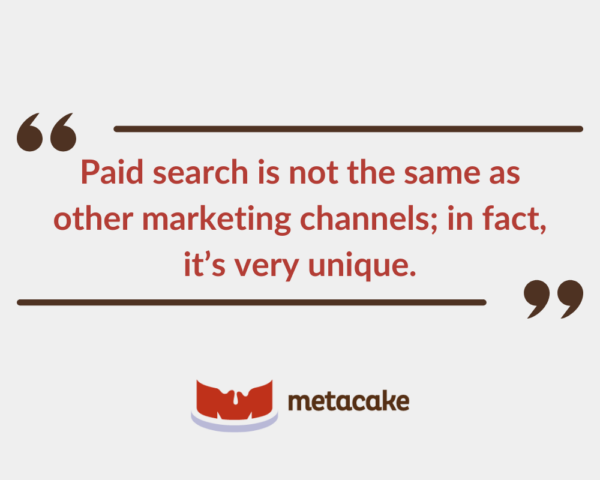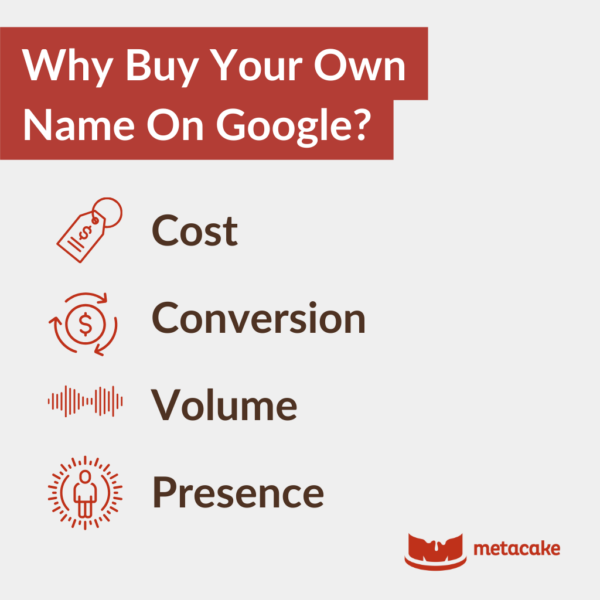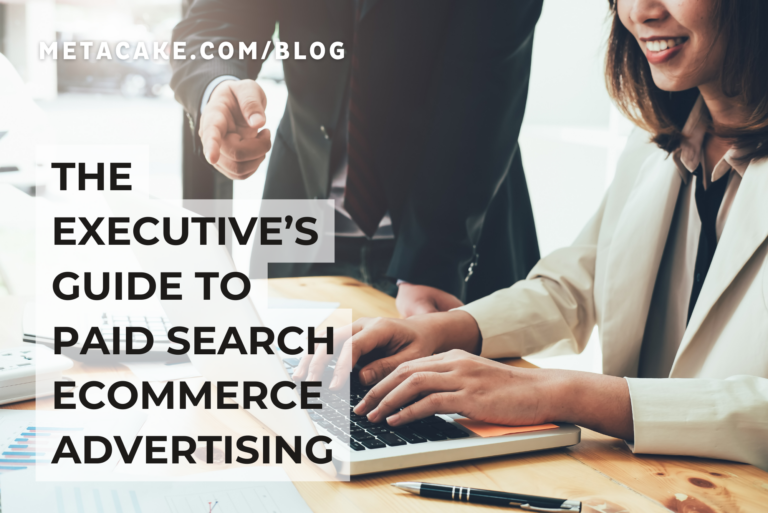This post is a continuation of our series for ecommerce executives. Regardless of your position (business owner, corporate-level executive, or ecommerce manager), it’s important to have an accurate, high-level understanding of what’s going on across the entire business.
For instance, marketing may not be your area per se, but you still need to know what a healthy growth strategy looks like — in each area — so you can guide those who are executing ecommerce advertising strategies.
Other posts in this series focused on growth marketing, but today we’ll take a more specific look at paid search advertising for ecommerce business. Why? Paid search is not the same as other marketing channels; in fact, it’s very unique.
In this post, we’ll explain how paid search advertising is different from other forms of paid advertising. We’ll dive into seven things to keep in mind when running paid search ads and how to know if your paid search strategy is working.

How Are Paid Search Ads Different From Other Paid Advertising?
Paid search advertising consists of ads on search engines like Google, Bing, or even YouTube — yes, YouTube is a search engine. The ads that appear are a result of the user’s search query. We call this intent-based marketing.
Intent-based marketing is much different than interrupting a user who’s scrolling through social media or in the middle of a Hulu episode. In some ways, advertising to someone on a search engine is the best time to advertise because their minds are set to investigate and purchase.
7 Prompts for Success When Using Paid Search in Ecommerce Advertising
Here are seven simple, effective prompts to keep in mind when incorporating paid search advertising in your larger marketing strategy.
1. Use paid search!
Simple but true. Paid search ads are an important, unique piece of the overall marketing strategy. If you’re not using these at all, you are absent from a critical step in a customer’s journey.
2. Value is more important than price.
While paid search ads are more expensive per click than other forms of advertising, they’re also more valuable per click!
You want your ads to be where users are looking for you, not where you’re an annoyance. If your ads are interrupting a user’s social media feed, that user may click on your ad to check you out. However, if that user clicks on your ad in a list of search results, then they are looking for you. Now we’re in business!
3. Don’t trick people.
Sneaky marketers or brands will run paid search ads that trick users with fallacies, like claiming to sell something they don’t, offering invalid discounts, and a myriad of other despicable behaviors.
This type of marketing will only hurt you and your budget in the end.
4. Paid search doesn’t have infinite volume.
Advertising on social media feels infinite. You can spend as much as you want as long as your return on ad spend remains steady. Paid search for ecommerce advertising is not that way.
Paid search is capped by the amount of search volume for the terms you’re bidding on. If a term does well, that’s great! But asking your ad specialist to crank up the budget for that term will only get you so far.
5. Buy branded terms.
Branded terms can refer to your own brand name — like Revision Skincare — but they can also refer to unique product names you sell — like Nectifirm. This differs from what we refer to as non-branded terms — like neck cream for women.
Why should you buy your own name on Google if you already show up in the organic listings? We dive into this in another article here, but the following is an overview:
- Cost: Branded terms are typically inexpensive. There aren’t as many people bidding on your brand name as there are bidding for non-product terms you want to rank for.
- Conversion: The return on ad spend we see for branded terms is typically very high. Those who are clicking are those who are intentionally looking for your site.
- Volume: There’s limited search volume for your branded terms, so you want to be there to capture those who are looking.
- Presence: You must be present to defend your brand! You may appear within the first few organic listings, but if you don’t show up at the top with the other ads, you give your competitors a prime opportunity to steal your potential customers’ clicks.

6. Advertise on Google Shopping.
In an ecommerce business, it’s important for your products to show up in the search results (paid search ads) and in Google Shopping listings.
This maximizes awareness, provides people with more opportunities to shop with you, and keeps you present among the competition.
Plus, it’s relatively easy and inexpensive to get Google Shopping set up.
7. Advertise on YouTube.
People do use YouTube as a search engine. In fact, it’s the second most popular search engine after Google.
With that in mind, YouTube ads present an intent-based marketing opportunity.
Even if you just run YouTube’s in-stream ads, which interrupt the user mid-video, these are a great awareness opportunity.
Those viewers will likely Google your brand name later, where you can show up with a Google search ad.
How Should You Measure the Success of Paid Search Advertising?
With so many metrics to keep an eye on inside of Google Ads Manager, it can be difficult to determine which are most important and which are indicative of the ads “working.”
If you’re looking over your Google ad expert’s shoulder for a read on how campaigns are doing, focus on these metrics to help measure success:
- Return on investment (ROI): This is different from ROAS.
- Conversion rate for paid search: Google Analytics can help you determine conversion rate by channel.
- Cost per acquisition (CPA): A metric that measures how much your business pays to attain a conversion.
- Click-through rate (CTR): Provides insight into how customers engage with your content.
- Google Trends: You’re likely to see your Google Trends rankings increase as your paid ecommerce advertising spreads awareness.
Is Your Brand Ready to Tackle Paid Search Ads?
Paid search ads are different from the rest of your paid advertising, and they’re a critical piece of a healthy ecommerce marketing strategy.
Don’t get caught up in the technicalities or hyper-focused on one campaign that’s performing best. All of your campaigns work together, just as the entire paid search channel works with the rest of your marketing strategy.
So, is your brand ready to take on paid search ads? Unsure of where to start? No worries, we’ve got your back. Reach out and let us guide you through the world of paid search ads in ecommerce advertising.
